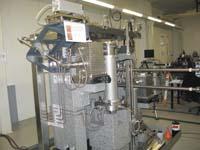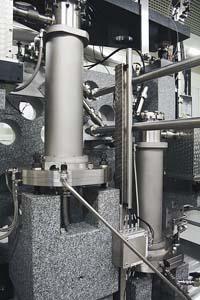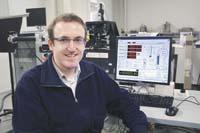Exact pressure measurement

The concept of primary pressure pattern, even if it seems complex, means a pattern with excellent characteristics to perform any pressure measurement, whose values are of reference. The primary pattern developed at the Tekniker-IK4 eibar technology center measures the difference between two pressures whatever they are, and has three main functions, according to the reference taken. On the one hand, it can function as a barometer and measure atmospheric pressure, on the other, it can measure absolute pressure by taking as a reference the vacuum and, finally, it can act as a manometer when measuring the difference between two pressures.
Pressure is the force produced by a fluid when it depends on gravity. To measure this force, the Tekniker-IK4 device takes into account the height difference between two mercury pipes.
"These two tubes are filled with mercury and communicated from the bottom. If both tubes have the same pressure, the liquid is at the same height. However, a pressure difference on this surface generates a height difference. On this surface we have placed a float with a mirror. This mirror is attacked by a laser beam that receives the upward or downward movement of the surface. From the measurements of this movement, taking into account the density of mercury and the geometric parameters, we calculate the pressure", explains the engineer Josu Egia of Tekniker-IK4.
In addition to these two tubes loaded with mercury, the primary pressure pattern has other tubes and mechanisms to introduce or extract pressure, generate vacuum or connect to the atmosphere, etc. For example, in the boxes next to these two tubes there is a laser wavelength compensation system. In addition, it has a special granite support that isolates the primary pressure pattern from external vibrations, giving stability to measurements.
High precision

As it is a high precision meter, the cabin or environment in which this primary pattern will be located must meet a number of characteristics to make precise measurements. "On the one hand, the environment must be controlled in terms of temperature. That is, the room should be at 20 degrees, one hundredth of the grade at most. On the other hand, the floor on which the pattern will be located must be isolated from the structure of the building," says Egia.
All this ensures device accuracy and measurement accuracy. This primary pressure pattern differs from all others.
"Less uncertainty about other devices in the world due to their greater accuracy and better control of all parameters. The value this device gives is a real value," he says. "This is achieved by controlling all the parameters involved in the measurement, i.e. temperature, mercury density and height measurement. In each of the three, you have to be very safe and precise," he adds.
His expertise in precision engineering has been Tekniker's main contributions to this project. At the Spanish Metrology Center they are experts in measurements. The pressure pattern developed jointly represents a breakthrough for the Metrology Center of Madrid.

"In short, it gives the laboratory some independence. Before the pressure meters were transported abroad for comparison and calibration, to the United States, Japan or England. Now he doesn't need it and that gives him independence. In addition, thanks to the improvement of the measurement of the systems through the application of engineering techniques on the uncertainty used in Tekniker-IK4, their equipment has also been improved due to the existence of better meters at the" says Egia.
Ten years have passed since the idea of developing the pressure pattern emerged until the Metrology Center receives the approval, and currently the most accurate pressure meter in the world is underway in Madrid.





